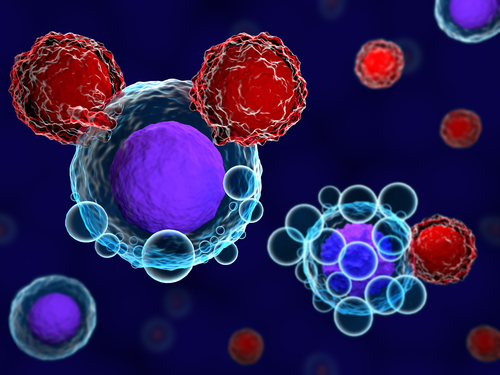An initial review of two ongoing Phase 1 trials evaluating SPEAR T-cells targeting MAGE-A10 in non-small cell lung cancer (NSCLC) and in bladder, melanoma, and head and neck cancers, revealed that the therapy is safe and well-tolerated.
The findings led to the expansion of the triple tumor study, which will now treat patients with the next SPEAR T-cell dose of 1 billion cells. Researchers will discuss escalating the NSCLC study after the sixth patient has been dosed.
“These safety results, with one of our wholly-owned SPEAR T-cell treatments, and the upcoming escalation to the next dose in the triple tumor study are significant as they allow us to progress treating patients in these studies at a potentially active cell dose,” Rafael Amado, chief medical officer at Adaptimmune Therapeutics, said in a press release.
MAGE-A10 is a cancer antigen, or molecule that can trigger an immune response against cancer. Researchers have found high levels of its expression in multiple solid tumors.
Adaptimune’s therapy uses a patient’s own T-cells and modifies them to bind to a particular cancer protein, in this case, MAGE-A10. This improves their ability to recognize and kill cancer cells. The company calls the T-cell platform it developed SPEAR, for specific peptide enhanced affinity receptor.
The MAGE-A10 SPEAR T-cell therapy is currently being tested in two Phase 1 dose-escalation trials. One study (NCT02592577) is being conducted in patients with late-stage (stages 3 and 4) NSCLC. The other (NCT02989064) is testing the approach in three cancer types: bladder, melanoma, and head and neck cancers.
Both trials planned to test three doses of SPEAR T-cells: 100 million, 1 billion, and 5 billion cells.
To date, five NSCLC patients and three patients from the triple tumor study have received the lowest treatment dose, 100 million cells. Therapy showed a good safety profile, with no major toxicity events being reported.
One NSCLC patient experienced a serious adverse event — cytokine release syndrome — which was resolved with treatment. In the triple tumor study, all adverse events were either mild or moderate in severity and were resolved with supportive treatment.
An independent safety review committee reviewed these data and decided that a higher dose of MAGE-A10 SPEAR T-cells can be tested in the triple tumor study. The administration of a higher dose in the NSCLC study will be reviewed by the committee after dosing of additional patients.
Adaptimmune expects to announce additional safety and efficacy data from the two trials in future scientific meetings.


